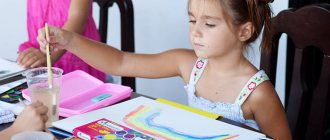Well-being of the child in the family.
Topic 7. The idea of the family as a developmental system. The role of the family in meeting the developmental needs of the child
Lecture (1 hour)
Plan:
1. The concept of family.
2. Family functions.
3. The well-being of the child in the family.
4. Conditions for effective educational influence.
5. Characteristics of psychological and pedagogical factors in raising children.
6. Family life and educational functions of parents. Psychological culture of the family.
7. The influence of the family on the formation of the “I-concept” of the individual
Family concept
There are several definitions of family. Firstly, a family is a small social group based on marriage and (or) consanguinity, the members of which are united by living together and running a household, emotional connection and mutual responsibilities towards each other.
Secondly, a family is a social institution characterized by a stable form of relationships between people, within which the bulk of people’s daily lives are carried out: sexual relations, childbirth and the primary socialization of children, a significant part of household care, educational and medical care, etc.
All seven have something in common - this is a family way of life, in which humanity has found the only opportunity to exist, expressing its socio-biological nature.
Family functions
The main functions of the family, according to I.V. Grebennikov (Grebennikov I.V., 1991), are:
· reproductive (reproduction of life, that is, the birth of children, continuation of the human race);
· economic (social production of means of living, restoration of the forces of its adult members spent on production, running their own household, having their own budget, organizing consumer activities);
· educational (formation of the child’s personality, the systematic educational influence of the family team on each member throughout his life, the constant influence of children on parents and other adult family members);
· communicative (family mediation in the contact of its members with the media, literature and art, the family’s influence on the diverse connections of its members with the natural environment and the nature of its perception, organization of intra-family communication, leisure and recreation).
Researchers are unanimous that the functions reflect the historical nature of the connection between family and society, the dynamics of family changes at different historical stages. The modern family has lost many of the functions that cemented it in the past: production, security, education, etc. However, some functions are resistant to change, in this sense they can be called traditional. These include the following functions:
a) reproductive - in any family the most important problem is childbirth. The integrity of the sexual need, which ensures procreation, and love as the highest feeling makes it impossible to separate one from the other. Marital love largely depends on the nature of the satisfaction of sexual needs, the characteristics of their regulation and the attitude of the spouses to the problem of childbirth and to the children themselves;
b) economic-economic - includes feeding the family, acquiring and maintaining household property, clothing, shoes, home improvement, creating home comfort, organizing family life and everyday life, forming and spending a household budget;
c) regenerative - (Latin regeneratio - revival, renewal). Means inheritance of status, surname, property, social status. This also includes the transfer of some family jewelry;[22]
It is not at all necessary to literally understand “jewelry” as jewelry, they can be given to any stranger, but such a treasure as an album with photographs cannot be given to a stranger - only to your own family
d) educational and upbringing - (socialization). It consists of satisfying the needs for fatherhood and motherhood, contacts with children, their upbringing, self-realization in children;[23]
Family and public education are interconnected, complement each other and can, within certain limits, even replace each other, but in general they are unequal and under no circumstances can they become so. Family upbringing is more emotional in nature than any other upbringing, because its “conductor” is parental love for children, which evokes reciprocal feelings in children for their parents;
e) the sphere of initial social control - moral regulation of the behavior of family members in various spheres of life, as well as regulation of responsibilities and obligations in relations between spouses, parents and children, representatives of the older and middle generations;
f) recreational - (lat. recreatio - restoration). Associated with rest, organization of leisure, care for the health and well-being of family members.
g) spiritual communication - personal development of family members, spiritual mutual enrichment;
h) social status - providing a certain social status to family members, reproduction of the social structure;
i) recreational or psychotherapeutic - allows family members to satisfy the needs for sympathy, respect, recognition, emotional support, psychological protection, family is a niche where a person feels absolutely protected, where he is accepted despite his status, appearance, shortcomings.
While traditional functions began to sharply weaken, this new, previously unknown psychotherapeutic function arose.
M.S. Matskovsky (1989) supplements the main functions of the modern family with the following: economic and household, social status, emotional, sexual, the sphere of primary social control, the sphere of spiritual communication.
Some authors identify specific and nonspecific functions of the family (Kharchev A.G., 1968; Antonova. I., Medkov V.M., 1996; Navaitis G., 1999). According to A.G. Kharchev, the specific functions of the family flow from the essence of the family and reflect its characteristics as a social phenomenon, while non-specific functions are those to which the family was forced or adapted in certain historical circumstances.
The specific functions of the family, which include birth (reproductive function), maintenance of children (existential function) and their upbringing (socialization function), remain, according to the author, with all changes in society, although the nature of the connection between family and society may change over the course of history .
Nonspecific family functions associated with the accumulation and transfer of property, status, organization of production and consumption, rest and leisure, caring for the health and well-being of family members, and the creation of a microclimate that promotes stress relief and self-preservation. All these functions reflect the historical nature of the connection between family and society, revealing a historically transient picture of how exactly the birth, maintenance and upbringing of children in the family occurs (Antonov A.I., Medkov V.M., 1996).
In certain historical periods, the family performs all or almost all of the above functions; in other periods, some of these functions are taken over by the state.
Also, some authors divide functions into institutional and basic . Institutional functions are impersonal. These include: reproduction function; primary social and sexual control; economic support for children; support for the disabled; protection of the child’s rights to full development. Basic functions are aimed at ensuring that a person meets his personal needs in the family. These include: satisfying the need for love; function of emotional support and development of individuality; function of self-affirmation, self-realization, personal growth; psychotherapeutic function of the family; function of social responsibility for each family member; function of forming positive relationships; function of forming a cultural community.
The following family functions have now become more important: psychological safety, emotional satisfaction of all family members and preparing children for life in society. Their implementation presupposes the maturity of feelings and psychological culture.
Well-being of the child in the family.
Traditionally, the main institution of education is the family. What a child acquires in the family during childhood, he retains throughout his entire subsequent life. The importance of the family as an educational institution is due to the fact that the child stays in it for a significant part of his life, and in terms of the duration of its impact on the individual, none of the educational institutions can compare with the family.
It is in the family that the child receives his first life experience, makes his first observations and learns how to behave in various situations. It is very important that what we teach a child is supported by specific examples, so that he can see that in adults, theory does not diverge from practice. (If your child sees that his mom and dad, who tell him every day that lying is wrong, without noticing it themselves, deviate from this rule, all upbringing can go down the drain.)
The harmonious development of a child’s personality is possible in the presence of health, defined as a state of physical, mental and social well-being. The key concept for educators and psychologists will be the concept of mental health, which includes well-being in the emotional and cognitive spheres, neuropsychic state, normal character development and personality formation of children.
“Problem”, “difficult”, “disobedient”, “impossible” children, as well as children with “complexes”, “downtrodden”, “unhappy” - are always the result of incorrect relationships in the family. In recent decades, psychology has made a number of remarkable discoveries. One of them is about the importance of the style of communication between an adult and a child. As the world practice of psychological assistance to children and their parents shows, even very difficult problems with children are completely solvable if it is possible to create a favorable climate of communication in the family.
As a rule, children's difficulties serve as a projection of family relationships. Rejecting the isolated, non-family context of analyzing children's problems, we must also pay attention to the fact that the roots of these problems are formed in early childhood. It is in early childhood that the basic substructures of personality and attitudes are laid down, which are difficult to correct in adolescents and then in adults.
Russian psychologists L.S. Vygotsky, S.L. Rubinstein, P.Ya. Galperin, L.I. Bozhovich, V.S. Mukhina and others call social experience embodied in the products of material and spiritual production, which is acquired by the child throughout childhood, as the dominant side in personality development. In the process of assimilating this experience, not only children acquire individual knowledge and skills, but their abilities develop and their personality is formed. For the development of a child’s personality, harmonization of family relationships is important.
The problem of child-parent relations is determined by the complexity of the object structure - the whole variety of relationships between children and parents, those violations in child-parent relations that can have a significant impact on the well-being of the child in the family and his further development.
Considering the family as the most important condition for ensuring the psychological well-being of a child, it is necessary to proceed from the following provisions.
1. There are “normal” and “disturbed” child-parent relationships, which directly cause difficulties in the development of the child.
2. For the successful development of a child, it is necessary to understand the problems of marital and child-parent relationships and harmonize the influence of the family on the upbringing of the child.
As a result of the mutual influence of individuals in the family, it acts as a personal microenvironment for personal development. The main links of the family, as a microenvironment of development, are: collective opinion, interpersonal intra-family relationships, family traditions, customs, moods, norms of intra-family behavior, moral and spiritual climate.
A family is characterized by a certain structure, a certain internal arrangement and grouping of its members. The basis of family life is the communication system - interpersonal, intrafamily and external contacts, interactions both during joint activities and during rest, exchange of information, mutual educational and mobilizing influences, mutual assistance, the desire for unity of thoughts and actions, as well as the individual characteristics of each family member.
An important place in the life of a full-fledged family is occupied by the upbringing of children from birth to the start of work. Its effectiveness is directly dependent on numerous factors influencing the educational potential of the family.
In different categories of families, the process of raising children has its own characteristics. Therefore, it is important not only to study significant factors, but also to identify their general relationships and interdependencies with the effectiveness of the educational process.
Criteria by which one can judge the psychological well-being of a child in a family:
- a pronounced experience of pleasure from communicating with loved ones;
- a feeling of freedom and autonomy when communicating with parents;
- self-confidence and self-sufficiency;
- the ability to see one’s shortcomings and the ability to ask for help from others;
- the ability to see your mistake as if from the outside and not associate your personality with it.
Thus, the family acts as a personal microcosm of the child in which he grows and is brought up.
The importance of the influence of family and family ties on the formation and development of a child’s personality has become obvious. Family and public education are interconnected, complementary and can, within certain limits, even replace each other, but in general they are unequal and under no circumstances can they become so.
Family upbringing is more emotional in nature than any other upbringing; its conductor is parental love for children, which evokes reciprocal feelings in children for their parents.
1. Family is the basis for a sense of security. Attachment relationships are important not only for the future development of relationships - their direct influence helps reduce the feelings of anxiety that arise in a child in new or stressful situations. Thus, the family provides a basic sense of security, guaranteeing the child’s safety when interacting with the outside world, mastering new ways of exploring and responding to it. In addition, loved ones are a source of comfort for the child in moments of despair and worry.
2. Models of parental behavior are formed in the family. Children usually tend to copy the behavior of other people, and most often those with whom they are in closest contact. Partly this is a conscious attempt to behave in the same way as others behave, partly it is an unconscious imitation, which is one of the aspects of identification with another.
3. Interpersonal relationships experience similar influences. In this regard, it is important to note that children learn certain ways of behavior from their parents, not only by assimilating the rules directly communicated to them (ready-made recipes), but also by observing the models existing in the relationships between parents (examples). It is most likely that in cases where the recipe and the example coincide, the child will behave in the same way as the parents.
4. Family is a place for gaining life experience. The influence of parents is especially great because they are the source of necessary life experience for the child. The stock of children's knowledge largely depends on the extent to which parents provide the child with the opportunity to study in libraries, visit museums, and relax in nature. In addition, it is important to talk a lot with children.
5. Children whose life experiences include a wide range of different situations and who know how to cope with communication problems and enjoy diverse social interactions will adapt better than other children to new environments and respond positively to changes occurring around them.
6. The family is the place where a child’s behavior is formed. Parents influence the child's behavior by encouraging or condemning certain types of behavior, as well as by applying punishment or allowing an acceptable degree of freedom in the child's behavior. In childhood, it is from the parents that the child learns what he should do and how to behave.
7. Communication in the family is the key to the success of the unborn child. Communication in the family allows the child to develop his own views, norms, attitudes and ideas. The child's development will depend on how good the conditions for communication are provided to him in the family; development also depends on clarity and clarity of communication in the family.
Thus, the family is the key to the success or slowness of the child’s development.
Family can influence a child both positively and negatively. The positive impact on the child’s personality is that no one, except the people closest to him in the family - mother, father, grandmother, grandfather, brother, sister, treats the child better, loves him and cares so much about him. And at the same time, no other social institution can potentially cause as much harm in raising children as a family can do.
When raising children in a family, the following points must be taken into account:
- a child is not simply a product of the educational influences of his parents. He is active, he himself comprehends the family and himself in it, determines his behavior, attitude towards the family and himself. To a certain extent, the child is his own educator;
- Children, due to their limited experience and unique thinking, perceive and evaluate what is happening around them differently than adults. You can understand their behavior, emotions, experiences and help them only by looking at the world through their eyes;
- Children are influenced not only by the intentional influences of their parents, but even to a greater extent by all the features of the parents’ behavior, including those that are not realized by either the adult or the child.
The educational influence of the family on children is most effective under certain conditions.






